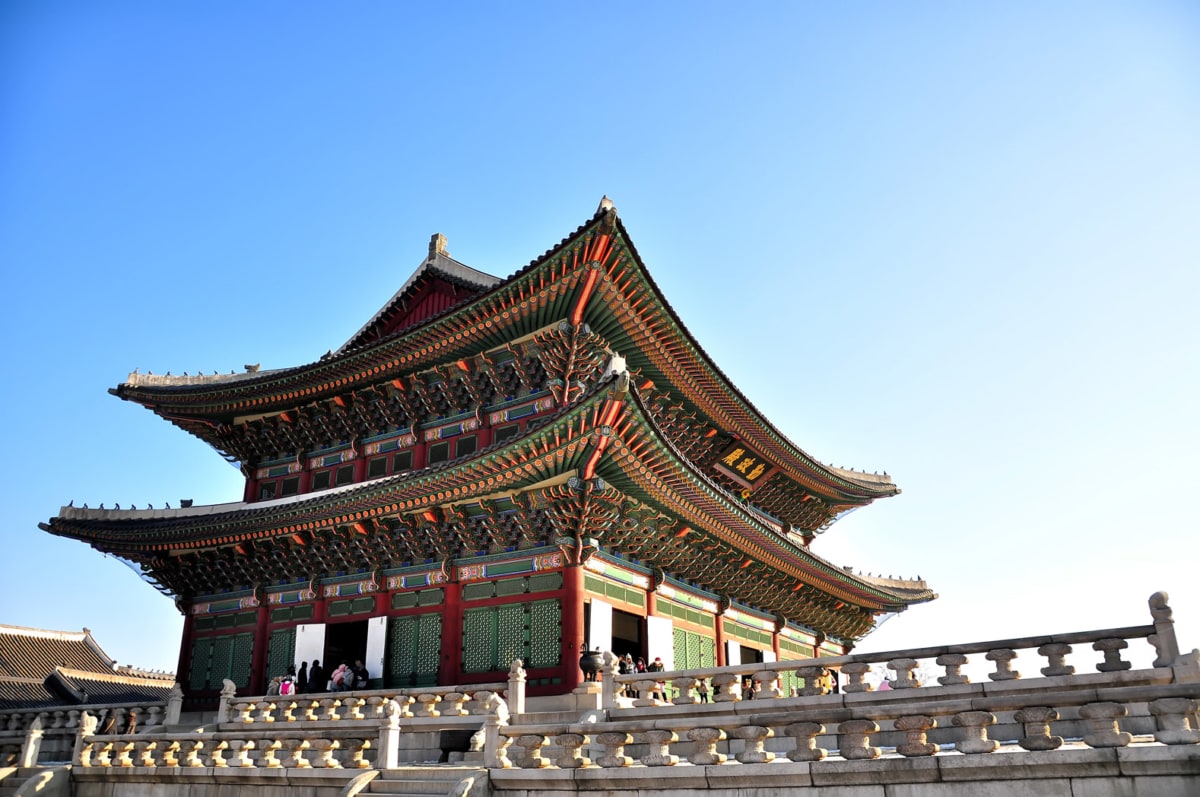Teaching English in Korea could be one of the best decisions of your life. You can earn a high salary with plenty of time off to travel around Asia! Ready to get started? Here’s how.
Everything You Need to Know About Teaching English in Korea
Teaching English abroad is one of the best travel jobs to make money while you travel the world. You’ll experience new cultures, meet new people and, most importantly, you’ll take a big, big step outside of your comfort zone.
But if you really want to make bank, you should seriously think about teaching English in Korea.
South Korea has long been a favorite among English teachers because of the generous salaries and job perks. Admittedly, there are some places in the Middle East that will pay more, but they simply can’t compete with South Korea’s cosmopolitan cities and lush nature.
For many, teaching English in Korea is one of the best decisions they ever made.
Sure, you have to work hard (no turning up to lessons hungover or without a lesson plan!), but teaching in South Korea is deeply rewarding—from the smiles on your students’ faces to the abundant travel opportunities to the hefty paycheck each month.
If you’re ready to trade your hometown to teach English in Seoul or one of South Korea’s other vibrant cities, you’ll need to be prepared.
Here’s everything you need to know about teaching English in South Korea.
Teaching English in Korea: What to Know Before You Go
Before you even think about booking your flights, I strongly recommend securing a teaching job in South Korea. The last thing you want is to be roaming the streets of Busan with your résumé trying to find someone to employ you. Get it all sorted before you go and you will have a much easier time.
Get the Right Qualifications
Let’s start with the basics. What qualifications do you need? South Korea really needs English teachers so the requirements are less stringent than you might think. But the essentials for all schools include the following:
- Citizenship from an English speaking country (U.S., U.K., Ireland, Canada, Australia, New Zealand or South Africa)
- A Bachelor’s degree from an accredited college or university
- A clean criminal record, health check and drug test
If you’re looking for the better, higher-paying teaching jobs in Korea, you will also need:
- The completion of a 100-hour TEFL course or
- Prior teaching experience
Teaching experience may be hard to get in the short time you have before you leave, but the TEFL certification is not. And, remember, it is absolutely possible to work abroad without any experience. You just might not get the best job.

TEFL stands for Teaching English as a Foreign Language. It is a course you can do either online, in person or as a mixture of the two. And it’s extremely beneficial to have for those who want to teach English in South Korea. There are plenty of online providers that offer affordable TEFL courses.
The TEFL Academy is one of the leading providers in TEFL certifications, offering a variety of courses and, best of all, job assistance once you complete your training.
Don’t be put off by the prospect of 100 hours of work. When I did this 120-hour TEFL course, it actually only took me 35 hours to complete!
The online course is the easier option as you can complete the whole course from the comfort of your home. However, opting to undertake at least some of the course in person will give you valuable classroom experience. It’s up to you to decide which best suits you.
Choose Where You Want to Teach English in Korea
Public schools in Korea are government-run and are similar to the public schools in the U.S. There are three employers that hire teachers in public schools:
- EPIK (English Program in Korea) is the largest employer and covers the majority of the country.
- SMOE (Seoul Metropolitan Office of Education) covers the public schools in the capital and is the most competitive program.
- GEPIK (Gyeonggi English Program in Korea) applies only to the Gyeonggi area outside Seoul.
Private schools (hagwons) are privately owned academies that school children attend before or after regular school in order to improve their English.
There are pros and cons to English teaching in both public and private schools but the general consensus is that public school teaching jobs are better. Of course, don’t blindly take my word for it. Here is a quick breakdown of the pros and cons of each so you can make up your own mind.
| Pros | Cons | |
| Public School | Regular working hours (8am-5pm Monday to Friday) 18-25 days paid vacation (plus 13-15 national holidays) Better job security (hagwons can close whenever they want) | You will probably be the only English teacher and that can get lonely. Class sizes of 30+ You can’t choose your location |
| Private School | A lot of other English teachers to hang out with Less competitive to get a job Small class sizes (usually less than 15 students) | Only seven to 10 days paid vacation per year (plus 13-15 national holidays) Shift work that makes travel planning difficult Heavier workload than with public schools |
Where to Find English Teaching Jobs in South Korea
Once you have ticked all of the eligibility boxes for teaching English in South Korea, it’s time to start looking for a job. There are dozens of job boards out there with listings of Korean schools with vacancies. Some are better than others, so approach with caution.
Here are some of the best TEFL job boards:
These job boards have postings from schools all over the world. When you find something you like, send off an application.
Make Sure You Apply on Time
Knowing when to apply is key in order to have the best chances of getting the teaching job you want.
For private schools, the timing is a bit more flexible. There tend to be more teaching jobs just before the beginning of semesters one and two (August and February, respectively), but there are usually jobs available year-round.

For public schools, the application window is narrower. Virtually all public schools hire up to nine months before the start of each semester. The first semester starts around September 1st and the second semester two starts around March 1st. This means you can apply as early as January for a September start, or June for a March start.
Teaching jobs are normally allocated on a first-come-first-serve basis. So, if you have your heart set on a particular job or program, apply as early as possible.
Best Places to Teach in South Korea
There are plenty of amazing cities and teaching destinations in South Korea. And while your choice of destination will likely be somewhat governed by job opportunities, it may be worth channeling your search toward the places you find most attractive.
Here’s a brief breakdown of some of the best places to teach English in South Korea.
- Seoul – The capital city and most popular choice for foreign English teachers. An enormous, bustling city with a vibrant nightlife and everything one could need. It’s fast-paced, energetic, and intense.
- Busan – Korea’s second-largest city after Seoul, Busan is a sprawling coastal metropolis with all of the classic big-city comforts. Stunning beachfront and a pleasant climate add to the appeal.
- Daegu – A mid-sized, mountainside city just a short train ride from Busan. Daegu has been gaining popularity among English teachers in recent years. It offers the amenities of a big city without the chaotic atmosphere.
How Much Can I Earn Teaching English in South Korea?
They say money can’t buy you happiness, but I reckon there are a few teachers in South Korea that would beg to differ. South Korea offers one of the highest English teacher salaries in the world. Generally, a first-time English teacher in Korea makes around $1,800 tax-free per month. This can go up as high as $2,500 per month for experienced teachers.
Be thrifty and you can save thousands of dollars over the course of the year. Alternatively, live your year in South Korea like royalty and get Korean fried chicken delivered to your door every night. Either way, you’re winning.
But, a generous salary is not the only thing on offer in your teaching contract. Here are all the other wonderful perks to which you’ll be entitled:
- Return airfare to South Korea from your home airport
- Free housing near your school
- Paid holiday (seven to 10 days for private schools and 18 to 25 days for public schools)
- Free healthcare
- Paid sick days (the number varies per school)
- Completion bonus (usually the equivalent of one month’s pay)
- Severance Pay
- Renewal Bonus
Your severance pay will be given at the end of your year teaching, as will your renewal bonus if you want to extend your time.
Severance Pay
That’s right, at the end of your contract you will be given severance pay, which is an amount paid to an employee upon dismissal or discharge from their employment. This is usually around one month’s salary, but I know people who have been given up to $5,000 at the end of their contract.
This is the easiest money you will ever earn, so cherish it. (And maybe even use it to keep traveling around Asia!)
Renewal Bonus
Some people simply cannot bring themselves to leave Korea, and I don’t blame them. The people are great, the food is to die for, and the living is easy. Every teacher will have the chance to renew their contract when it finishes.
If you decide to stay on for another year at the same school, you will be given a renewal bonus of around $1,800 when you re-sign your contract. That is essentially free money.

You will also be given up to 10 more days paid vacation per year, but the amount of extra days is at the discretion of the school. And, if that wasn’t enough, you’ll also get a raise that the school deems appropriate.
There are also some schools that offer free school lunches, but you will need to check with your school individually for this. The school will also assist you in getting the correct visa you need to work and live in South Korea.
Learn Some Basic Korean
The final thing to do before you head off for South Korea is to get a basic grasp on the Korean language. It is a fatal mistake to assume that everyone speaks English. You will struggle in South Korea if you do not speak at least a bit of Korean.
Duolingo and Memrise are two excellent apps you can download onto your phone to help you learn Korean. Spend an hour or two per day on these and you will gradually feel more comfortable with the language. Of course, once you’re there you can take your learning to the next level—immersion is the best way to learn a language.
This might seem like a lot to take in, but trust me when I say that it’s easier than it sounds. The most important thing is that you give yourself plenty of time. Teaching English in South Korea cannot be a last-minute decision. I recommend applying for teaching jobs nine months before you want to head out and absolutely no later than six months.
On the Ground Advice for Teaching English in Korea
You will be required to arrive in South Korea around 10 days before the start of the semester. This gives you time to settle in and to attend orientation and training days. To sweeten the deal, you also get $300 as a settling-in allowance.

So, you’re all set up in your apartment and you’ve worked out the quickest route to your school. Now what?
Get to Grips With the Teaching Culture
The teaching culture in South Korea is completely different from anything you’ve experienced back home. But, it won’t take you long to understand it. Here are some important pointers:
- There is a LOT of pressure on South Korean kids to excel. In fact, it is common for children to finish school and then go to a private school in the evenings for extra tuition.
- It is also not unusual for children to stay up past midnight finishing homework. This means your kids may sometimes lack the energy to play games all day or to engage fully with the lessons.
- South Koreans are competitive. This can be helpful when you’re trying to motivate students in the classroom, but it can also cause students to become quickly disheartened. The school system in Korea works in such a way that most good students get As or perfect scores all the time. It can be a real shock the first time they get a B.
- The teaching culture in South Korea emphasizes rote learning. In other words, memorizing words, grammar, idioms, etc. without much interaction or participation. As a result, your students may be too shy to speak out loud in front of the class at first.
- Classes are mixed ability. In the US and UK, classes are often separated by ability. In South Korea, no such thing exists. As a consequence, you may have a class of 40 students, some of whom can converse fluently in English while others can barely string together a sentence. This can make it challenging (but not impossible) to prepare lesson plans and materials.
- South Korea has a very homogenous culture. There are very few foreigners wandering the streets and there is a strong mentality of “fitting in.”
Some Tips to Help You Teach in South Korea
These differences sound intimidating and, at first, they will be. But, remember, children are essentially the same everywhere in the world, no matter what their background. They respond well to enthusiasm, dynamism and fun.
- To encourage your students, give out points for behavior, attitude, participation, etc. This way, even if they are struggling to learn English, they still have the chance to gain points or get high grades.
- Break them into class participation gently, they will come out of their shells eventually.
- Calling out a student in front of the class or making them do something that will force them to stand out can be painfully embarrassing. Approach this with caution.
Understanding How Korean Culture Works
Your experience teaching in Korea will not be limited exclusively to the classroom. You need to understand how life works out in the real world.
South Korea has a very rigid social hierarchy. It is common to be asked your age, so people can work out where you rank compared with themselves. People of a higher social status command respect and will often dominate conversations. This can get annoying, especially if you are young, but you will get used to it.
Other important things you should bear in mind include the following:
- You must take your shoes off before entering someone’s home; keeping shoes on is highly disrespectful.
- Saving face is incredibly important. Koreans will try and maintain a peaceful and comfortable atmosphere at all times, even if it means telling a “half truth.” Embarrassing someone in front of other people is poor etiquette.
- Image is everything in South Korea. You’ll often see women dressed in heels just to get groceries.
- Bowing is the standard way of greeting people. The higher the status of the person you are meeting, the deeper your bow should be.
- People will stare at you and may even ask to take photos of you. It is not meant as an insult; there just aren’t many foreigners in South Korea, and you are a curious novelty.
- It would take me weeks to write an exhaustive list of what to look out for, but these pointers are a good place to start. As a foreigner you will be given a lot of leeway when it comes to social norms, so don’t worry too much about offending people. By the end of your year you will feel much more comfortable with Korean etiquette.
Continue Learning Korean
Remember all that time you invested into learning a new language just so you could travel to South Korea? Well, now is your chance to practice. My advice is to try and make some Koreans friends. This isn’t easy, but it is far from impossible—especially once you can speak basic Korean. It is tempting to spend all your time with other English speakers, but you’ll never improve your Korean if you don’t regularly engage with locals.
You might also want to check out language-learning tools such as Rosetta Stone, an award-winning language solution that combines proven learning methods and teaches you to use new words and phrases based on real-world context. Rosetta Stone offers a 30-day guarantee that you’ll be learning Korean in no time.

The more Korean you know, the richer your experience in Korea will be. You will be able to talk to Koreans and find your city’s hidden gems and local secrets. You’ll also gain a deeper understanding of their fascinating culture. Plus you’ll be able to put “fluent Korean” on your résumé when you’re back home, which is a nice bonus.
Use Your Free Time to Travel
Here’s the part you’ve been waiting for. Working abroad is the best way to make money while you travel. While you’re teaching English in Korea, you should be constantly making plans to explore the rest of South Korea and its neighboring countries.
Use your weekends, national holidays, and paid vacation to travel. You will be earning more than enough to take regular trips, so make the most of your abundant time and money.
South Korea has a fantastic train network, so getting around the country is easy and affordable. From Seoul, virtually every part of the country is accessible by train.
Once you’ve seen everything you want to in Korea, consider visiting nearby Japan, China, Mongolia and Taiwan. Tiger Airways, Indigo and AirAsia are great budget airlines that offer cheap flights around the area.
Of course, there are some people that would rather spend all year working and saving money so they can travel long term after their year of English teaching is finished. I met people who saved in excess of $10,000 whilst teaching English in Korea. This allowed them to travel for an entire year afterward without having to work.
Tutor to Earn Extra Cash
You will be making more than enough money from your teaching salary to cover your living costs and to save. But, if you want a little extra disposable income, or you simply want something to do with your free time, consider private tutoring. Korean parents are desperate for their kids to get ahead, so there is always a demand for private tutors.

The best way to find private tutoring jobs is to ask around. You will undoubtedly encounter parents and adults looking to learn themselves, business people, and bored housewives who would be willing to pay you for your services.
Final Thoughts on Teaching English in South Korea
Teaching English in Korea is not a vacation. It’s hard work and there will be days when you want to give up and go home.
Then there will be days when your entire lesson plan goes out of the window, miniature satans replace your students, and the canteen gives you a fermented fish for lunch. You have to just ride it out.
But you will also have days when your students are as good as gold. They hang on your every word, complete their activities, and keep the volume down.
Your heart will swell with pride as they recite their new vocabulary and compete to show you how much they have learned.
When you feel like you want to throw the towel in, remember why you came. You wanted to step out of your comfort zone, immerse yourself in a foreign culture, and make money to travel.
You wanted to make a difference—not just to your own life, but to those of others. They might be misbehaving now, but your students will remember you forever.
Think about the good days you’ve had and the even better days that are to come when your bank is full and you’re traveling the world. And I guarantee you that if you put the effort into planning your lessons, you will have far more good days than bad with your classes.
If you are looking for a way to make some serious money and see the world while you’re at it, there are few ways better than spending a year teaching in South Korea.
Don’t forget to sign up for your TEFL course here so you can make this happen!
Teaching English in Korea FAQs
-
Are English teachers in demand in South Korea?
There is high demand for English teachers in South Korea.
-
What are the requirements to teach English in Korea?
To teach English in Korea, you need a 4-year college degree and a TEFL certification.
-
Can you teach English in Korea without knowing Korean?
Yes, you can teach English classes in China without speaking a word of Chinese.
-
Can Americans teach English classes overseas?
Yes, many countries like China, South Korea, and Japan have a high demand for Americans or other native English speakers to teach English classes.
-
Is it hard to become an English teacher in Korea?
If you have a 4-year degree and are a native English speaker, it isn’t hard at all to become an English teacher in Korea.


I am study korean lenguage at my college in Australia. It’s interesting and funny) I think it’s very cool and useful for everyone. I mean that korean students learn english and australian stusents learn korean.That make easier our comunications with other world. Wiriting on korean is very funny)
I am very interested in teaching English in Korea.
this is the most helpful guide i came across, thank you so much! you put so much details and precision into it ? i hope i will meet you oneday.. you inspired me the best ????